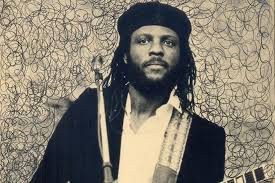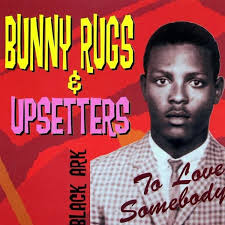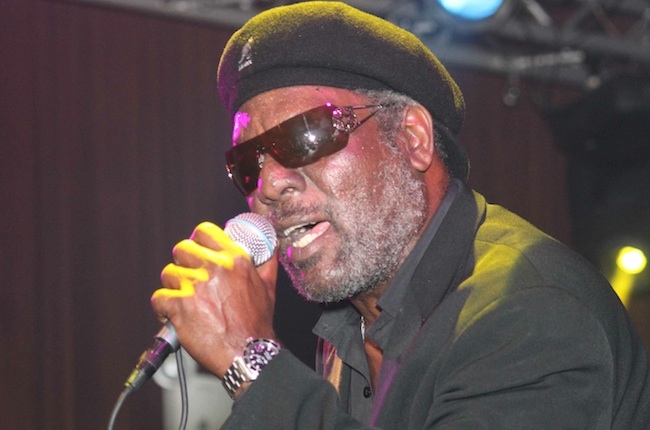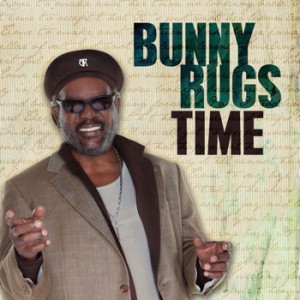Third World’s William “Bunny Rugs” Clark at Manhattan’s Highline Ballroom in 2011.—-
(Photo credit: MyFlash Photography
The life and music of William “Bunny Rugs” Clark, 65, lead singer of the evergreen reggae band Third World who passed away on Feb. 2, was celebrated on Monday, Feb. 24 at a service at Kingston’s Holy Trinity Cathedral. A concert immediately followed at Kingston’s Ranny Williams Entertainment Center headlined by past and present members of Third World, including founding members, guitarist Stephen “Cat” Coore and bassist Richie Daley who have been with the group for its entire 41-year span. According to Third World’s manager Heather Cameron, Bunny Rugs died in an Orlando, Florida hospital, succumbing to complications from MDS (myelodysplastic syndrome), a rare bone marrow disorder.
Throughout his esteemed six-decade spanning career, Rugs released six solo albums, most recently “Time” on his own Raw Edge Production label in 2012, but his greatest contributions as a global reggae ambassador were made as the lead voice of Third World.
The enormity of Rugs’ musical offerings was reconfirmed to Daley on Tuesday, Feb. 25 when he attended an evening concert at Kingston’s Edna Manley School of the Performing Arts, featuring four young bands (unaware of his presence) performing Third World’s music. “They were playing songs like ‘Cool Meditation’ and ‘Talk To Me,’ that we haven’t played in years, and I could see the influence of Rugs’ stage craft in these young people,” Daley told Billboard.biz. “That brought to light how much they listened to and felt his songs, which gives me all the assurance I could possibly want that his legacy will live on.”
 L-R: Cat Coore, Richie Daley, William “Bunny Rugs” Clark. (Photo credit: KEK Photos)
L-R: Cat Coore, Richie Daley, William “Bunny Rugs” Clark. (Photo credit: KEK Photos)
Formed in 1973, Third World has released 20 studio albums, five live albums and nine compilations for various majors and independents; they have earned 10 Grammy nominations for Best Reggae Album and numerous awards including a United Nations Peace Medal in 1986 for their song lyrics’ inspirational content. Rugs’ richly expressive vocals were an essential component within the band’s enduring popularity, whether delivering somber commentary in “1865 (96° in the Shade)”, the euphoria of “Now That We’ve Found Love”, or conveying spiritual contentment on the danceable “Try Jah Love,” written by Stevie Wonder and recorded at his Wonderland studio in Los Angeles.

“Stevie Wonder respected Bunny’s unique voice and Third World’s harmonies,” recalled drummer William “Willie” Stewart, who was with the band from 1976 through 1997. “Wonder sent us to get lessons from Seth Riggs, one of the world’s best vocal coaches. Seth said Bunny had a special virtuoso voice and Stevie agreed; when Bunny hit those high notes on ‘Try Jah Love,’ you would see a big smile on Stevie’s face while he swayed his head from side to side approving that Rugs had the pipes to deliver the song’s serious message.” Included on Third World’s 1982 album “You’ve Got The Power” (Columbia), “Try Jah Love” peaked at No. 23 on the Black Singles Chart and No. 17 on the Club Play Singles Chart. The band cracked the Hot 100 in 1978 with their timeless reggae refashioning of The O’Jays’ “Now That We Found Love” (Island Records), which peaked at No. 47.
Award winning Jamaican singer A.J. Brown, who had replaced Rugs in Third World’s recent tours of Europe and the West Coast, will continue on as lead vocalist. He called Rugs’ voice “angelic, a force to be reckoned with; it cannot be overestimated how influential he has been to so many singers and I am one of them.”
 Original Third World Lineup, in the photo L-R: Michael “Ibo” Cooper, keyboards; William “Willie” Stewart, drums; Milton “Prilly” Hamilton, vocals; Richard “Richie” Daley, bass; Steven “Cat” Coore, guitar, cello; Irwin “Carrot” Jarrett, percussion.(Photo credit: Steve James)
Original Third World Lineup, in the photo L-R: Michael “Ibo” Cooper, keyboards; William “Willie” Stewart, drums; Milton “Prilly” Hamilton, vocals; Richard “Richie” Daley, bass; Steven “Cat” Coore, guitar, cello; Irwin “Carrot” Jarrett, percussion.(Photo credit: Steve James)
“Rugs had the rare ability to sing with a Caribbean style in an R&B voice and the songs he wrote, ‘Talk to Me’ and ‘African Woman,’ were extraordinary,” added Cat Coore. “A great human being with a kind heart, he gave to family and friends selflessly. His sound and energy will surely be missed.”
Born in Mandeville, Jamaica on Feb. 6, 1948, Rugs was raised in downtown Kingston; he was given the nickname Bunny by his grandmother because he liked to “jump around like a damn rabbit” and Rugs from his band mates “when they found out I liked to sleep on rugs and the floor.” At 14 years old Rugs realized he had “a voice,” by 15 he was the lead singer of Charlie Hackett & The Souvenirs, the resident band at Kingston’s Kittymat Club. “That was the key that opened the door to a singing career during Jamaica’s (mid 1960s) ska and rocksteady eras, when our artists weren’t recognized internationally because our music was just getting started,” Rugs told Billboard.biz in 2011.
Following his two years of study at the Jamaica School of Arts and Crafts, and a stint as one half of the vocal duo Bunny and Ricky, Rugs migrated to New York City in 1968 where he worked various jobs including a turn as a taxi driver. He was offered a job at a hospital and with UPS and appeared in an off Broadway play but he didn’t focus on those opportunities choosing, instead, to concentrate on his singing.
He fronted the Brooklyn-based Jamaican expatriate dance band Hugh Hendricks and the Buccaneers for a year and later the Bluegrass Experience with musicians Glen Adams, Eric Frater and Sparrow Martin. Rugs then returned to Jamaica and signed on as the lead singer with Inner Circle, formed by brothers Ian and Roger Lewis, on bass and rhythm guitar, respectively, featuring Michael “Ibo” Cooper on keyboards, Cat Coore on guitar and Willie Stewart on drums. Best-known internationally for “Bad Boys”, the theme to the TV show C.O.P.S. that peaked at no. 8 on the Hot 100 in 1993, back then Inner Circle was a Top 40 cover band. Before long Cooper, Coore and (eventually) Stewart broke away and started writing and performing original material in their own band: Third World.
Following a two-year association with Inner Circle, Rugs returned to New York, where he released reggae renditions of Bobby Womack’s “Harry Hippie” (BNM) and Neil Diamond’s “Sweet Caroline” (Boss Disc) in the early 70s, the latter a modest hit in Jamaica.
He returned home again and spent a year working with producer Lee “Scratch” Perry at his legendary Black Ark studios on his debut album “To Love Somebody” (Klik). Perry, peculiarly, credited the singer as Bunny Rugs Scott.

Rugs returned to New York in 1976 and began preparing a demo tape to present to the president of Atlantic Records. Third World, meanwhile, on their first US tour performed at the landmark Greenwich Village venue the Bottom Line. Rugs was in attendance and shortly thereafter was drafted as the group’s lead singer, replacing Milton “Prilly” Hamilton.
Rugs’ soulful versatility provided the ideal complement for the superb musicianship that has characterized Third World since their formation.
The band’s seamless incorporation of R&B, jazz, rock and classical strains into a distinctive reggae identity garnered widespread appeal, transcending racial, cultural and national boundaries.
“Hearing Third World’s arrangements, instrumentation, and use of percussion for the first time in the 1970s, was unlike anything else, almost otherworldly,” reflected Kingston born Sharon Gordon, now co-founder/chairperson of the Brooklyn, New York-based Coalition to Preserve Reggae Music.
“Rugs’ voice pushed notes to another level in such a identifiable way his vocals should be studied by upcoming generations of reggae singers.”
Willliam “Bunny Rugs” Clark is survived by his wife, Bouvier, and eight children.











